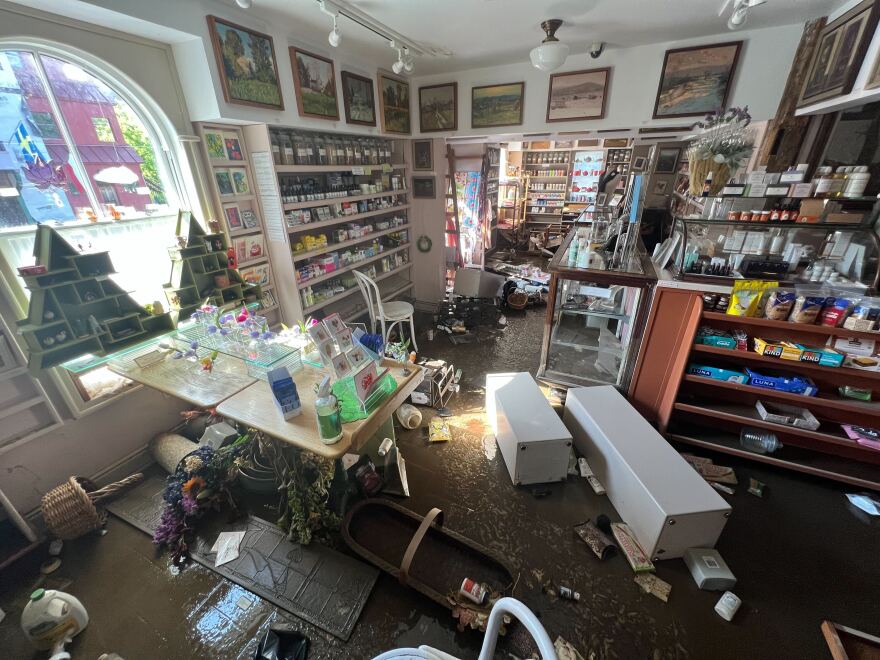This story, by Report for America corps member Carly Berlin, was produced through a partnership between VTDigger and Vermont Public.
As the rain lets up on Tuesday, Vermonters are returning to homes damaged by the worst flooding event the state has experienced in over a decade.
Here’s what you need to know about staying safe if you’re coming home to a flooded house, from electric hazards to mold prevention.
Use extreme caution around floodwaters
Many roads are still impassible because of floodwaters, which continue to rise in some areas. Do not drive into flooded areas.
If you can reach your home, avoid entering floodwaters: they can contain things harmful to human health, including downed power lines, sewage, and hazardous chemical waste. According to the Centers for Disease Control and Prevention, entering contaminated flood water can cause wound infections, skin rashes, gastrointestinal illness, and other complications.
If you do need to enter floodwater, wear rubber boots, rubber gloves, and goggles. The CDC also advises washing with clean soap and water as soon as possible afterwards, taking care of wounds, and washing clothes in hot water.
Cut off your power and gas, if possible
It’s important to cut off electrical power and natural gas or propane tanks in your home to avoid fire, electrocution, or explosions, according to the CDC.
If your main power switch is in standing water, do not power it off yourself – or use any electric appliances. The CDC advises calling an electrician if you need to enter standing water in order to access your main power switch. If you can get to it from a dry location, it’s okay to turn it off, according to the CDC.
Don’t turn your power back on before having an electrician check your house’s electrical system.
Beware of potential gas leaks. If you smell gas, turn off the main gas valve, open up windows and leave your home. Notify the gas company or your local fire department. Don’t turn on the lights or do anything that could create a spark.
If your power is out, and you’re considering using a generator, be careful about potential fire hazards and carbon monoxide poisoning. Never use a power generator inside your home.
Food: When in doubt, throw it out
Consuming food that’s come into contact with floodwater can make you sick. The CDC says it’s best to throw away any food with an unusual odor, color or texture; any food that’s stored in packages that aren’t waterproof; any food in cardboard containers, including baby formula; and anything with a screw cap, snap lids, twist caps, and more.
It’s also important to sanitize dishes, utensils, refrigerator drawers or kitchen countertops – any surfaces that have come into contact with floodwater. The CDC advises using a combination of hot, soapy water to rinse and then soaking items in diluted bleach.
Some items can’t be properly sanitized and should be thrown out, including wooden cutting boards, baby bottle nipples, and pacifiers.

Drinking water safety
Floodwater can contaminate drinking water by getting into groundwater supplies.
If you rely on a municipal water system, follow local guidance on whether the water is safe to drink. If you have a private well, get your water tested before using it.
If you’re concerned that your water might be contaminated, don’t use it to wash dishes, brush your teeth, prepare food, wash your hands, or make baby formula. Use bottled, boiled, or treated water instead.

Before cleaning up, document the damage
Once it’s safe to enter your home, document the damage by taking photos before you start cleaning up. This is an important step for filing a flood insurance claim, if you’re covered, or for applying for recovery aid through the Federal Emergency Management Agency.
Be extensive. FEMA recommends taking photos and videos of both the inside and outside of your home; getting images of the inside of cabinets and closets; and recording the serial numbers of large appliances like washes, dryers, and refrigerators.
Dealing with mold
After documenting the damage, start preventing mold. Air out your home by opening up windows, and remove water-damaged items like furniture.
If you’re not able to dry out your home within 24 to 48 hours, you should assume you have mold growth, according to the CDC. You’ll need to completely dry everything and clean the mold.
Exposure to mold can be harmful to human health, causing asthma attacks, eye and skin irritation, along with allergic reactions. You may want to consider hiring a professional to clean the mold from your house. If you opt to do it yourself, wear personal protective equipment like an N95 mask, gloves, and goggles. Use a wet vacuum to remove water from floors, carpets, and hard surfaces.
Open windows and doors to allow airflow while you work, if the weather permits; and use a dehumidifier if electricity is safe to use. If you use a fan, make sure it’s pointing outside; if it’s pointing inside, it can spread mold in your home. Clean mold with water and a detergent.
For more detailed instructions, see the CDC’s mold cleanup guide.

Returning to a flooded car
If your car was partially submerged in floodwater, avoid starting it right away, according to State Farm insurance — that can cause more (and expensive) damage if there’s water in the engine.
Start drying your vehicle as soon as you can; call a towing service to get it to higher ground, if possible. File a claim with your insurance company to determine the extent of the damage.




